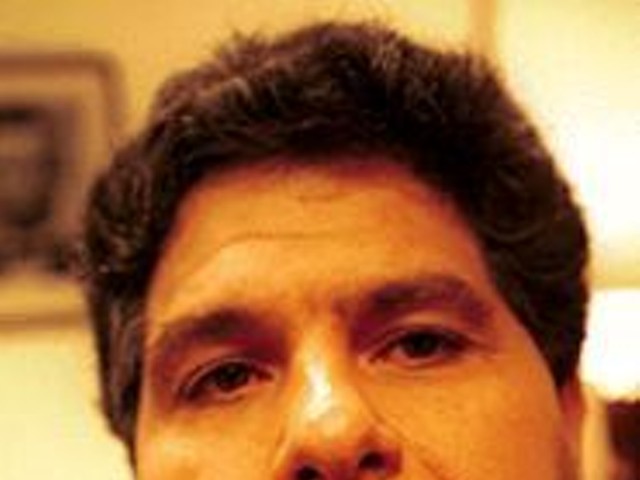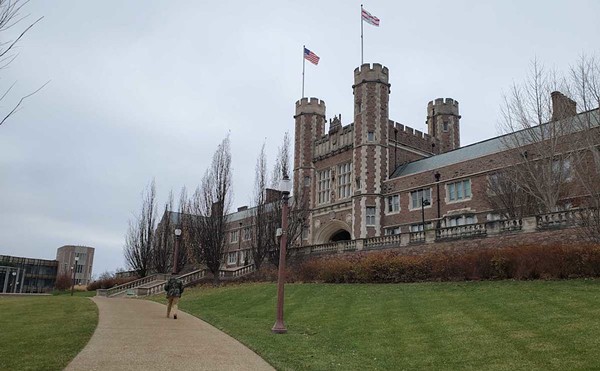How Crutchfield lost his left leg was a source of wonder and speculation. "I think he got it smashed between two cars," says Lockheed, "later in his life." Paul Cuba, the other owner of the music club, who died suddenly on March 4, a few days after being interviewed, dissented: "I heard it happened when he was a kid -- a train accident."
But one thing that Lockheed and various barbacks at the Venice do know is that sometimes a trip to the cellar to fetch libations was met with a series of resounding thumps. Crutchfield had a standing gig at the Venice -- every Wednesday night for 12 years. He would play keyboard and sing while tapping the foot of his wooden leg. "It never stopped," said Cuba, "and in the basement it was deafening. Sometimes it would seem that maybe he wasn't keeping time. It sounded like he was just thumping."
Cuba laughed as he conjured the quirks and idiosyncrasies of a good friend. There was the time Crutchfield announced some big news: "He came to me one day and said, 'I got a new leg! I got a new leg!' I said, 'Really? Neat.' He said, 'My first black one.' I said, 'What?' He said, 'Yeah, it's black. All the others were pink.'"
And so when Crutchfield died a few months ago at the age of 89, the idea of a memorial to him was born. Perhaps in unconscious anticipation of a shrine that would fit somewhere on the cluttered walls of the Venice, Lockheed had already bought Crutchfield's trademark light-yellow leisure suit. "I gave him 20 bucks for it," he says. "He was kinda shriveling up, and it got to the point where it wouldn't fit him anymore." They also had photos, a poster, keys from his electric keyboard and a copy of his 1983 album James Crutchfield: Original Barrelhouse Blues.
Acquiring the leg for use in the shrine first dawned on Lockheed and Crutchfield fan (and St. Louis excise commissioner) Bob Kraiberg at the musician's impromptu funeral march through the streets of Soulard, but it wasn't until the wake at the Ronald L. Jones Funeral Home that it seemed possible. It was a bluesman's funeral, with musicians playing in the parlor and Crutchfield laid out next to the band. "We asked Mr. Jones where it was," says Lockheed, "and he brought us in his office, let us take a peek."
"It was in this chair -- a chocolate-colored leg with a sock still on it," says Kraiberg. "That's when we knew we were on the trail. James was in the casket, and the leg was in the office."
Kraiberg asked Jones to approach Patricia Thomas, Crutchfield's granddaughter. "At first it was not acceptable to me," says Thomas, 49, manager of a Sears store. "I mean, that's kind of personal. Why would they want to show his wooden leg for people to gawk at it? Fact was, he hid it from us for a very long time. I know each morning, when Granddaddy got up, he always sat facing the wall for a few minutes. Grandmama's slop jar was on the other side of the bed, and I just thought he was staying away from that. I had no idea that's where he laid his leg each night and he'd put it on each morning. I had to be, oh, 12 before I knew it was not his leg. I just thought he walked with a limp."
But after she mulled over the request, the memorial didn't seem so outlandish. "The more I thought about it," Thomas continues, "exactly who and what my granddaddy was and what he felt about the blues and the people at the Venice Café, I decided that, really, it's OK. Granddaddy would like that." Kraiberg and John Biller, a certified public accountant, drew up a contract stipulating that if the family wasn't happy with the results, they could have the leg back.
It helped that Thomas had been to the Venice Café and seen her grandfather in his element, banging out some of the familiar songs she'd heard as a girl -- "Piggly-Wiggly," "Sittin' on Top of the World," "Walkin' the Dog." Thomas says that as kids, she and her cousins always looked forward to the weekend: "Grandma didn't allow much piano-playing during the week, but on Friday nights and Saturdays, that's what the family did. Everybody got together at the house and sat in the front room and listened to Granddaddy play blues -- and my favorite was "Walkin' the Dog." As a little girl, I always wanted him to play that. I would dance and dance ..."
Born near Bogalusa, La., Crutchfield left home early on and found temporary work with the railroad. He paid his dues playing piano in levee camps and honky-tonks, then came in 1948 to St. Louis, where he played the clubs and met new influences. He faded from the scene in his later years, only to be rediscovered by a new set of blues lovers.
In the late '50s, Crutchfield played piano at Rosalie Lovett's Left Bank in Gaslight Square, and that's where Paul Affeldt found him. Affeldt, owner of the Euphonic label, was on the road recording live blues in its element, the clubs.
When Gaslight Square took a dive in the early '60s, Crutchfield's steady gig went with it. For years, he worked as a cook at the state hospital. Finally his break came. "Swingmaster Records in Holland was aware of Affeldt's recordings, and they saw James as a leading exponent of the barrelhouse piano style," says Mark O'Shaughnessy, owner of BB's Jazz, Blues & Soups and an early Crutchfield promoter. Crutchfield proved hard to find, so the record producers hired a local cop, Charlie "the Hunter" O'Brien, to track him down. "O'Brien was snooping around, asking questions about James, and for a time James' friends threw him off, thinking it had to do with gambling," says O'Shaughnessy. "But when James found out who it was that O'Brien represented, then he let himself be found."
Local bar owners gladly perpetuated Crutchfield's comeback. He became a fixture at the Broadway Oyster Bar, Molly's and the Venice Café. His annual birthday party at Molly's on Memorial Day always heralded the Soulard beer-garden season. Even as he was playing almost nightly in the late '80s and the '90s, he was well up in years but still had stamina.
"James was a marathon guy," says Lockheed. "He'd play for hours at the Oyster Bar, then come here and play for four more hours." Fond of the nightlife, Lockheed says, Crutchfield didn't always want to go right home: "One night we went over to Leon's Astro Lounge in East St. Louis. James was driving his big old Delta 88, and on the way he says, 'Jeff, let me tell you something,'" -- mimicking Crutchfield's rapid, clipped speech -- "'first of all, you never go in here without me, and when we do go in, don't pay attention to what they're doing in that back room. No. 2: Don't mess with their women -- and if you do mess with their women, you better bring one for them."
"He wanted to be straight-up," said Cuba. "He'd feel bad if he had to pee, like he was wasting your time if he's not there playing. I remember he had a stroke on a Sunday and showed up for work on Wednesday in pajamas and a sportcoat, wearing his hospital wristband. I said, 'James, what're you doing here?' 'I gotta play. I need the money.' So I paid him to go home and take a break."
Toward the end, he sometimes forgot what night it was and where he was supposed to be. "Once in a while we had to go get him," says Lockheed. "Somebody would give him a ride up and a ride back."
These attentions were not lost on Thomas: "Around the time Granddaddy was having a comeback, I was busy with a family of my own. But later, when I realized just how important he was, then I began to come around, and I saw how everybody treated him in those places. I used to worry if he'd drink a couple beers and have to drive home, but then I saw how it was. If he needed a ride home, they took him home."
The Venice Café has had its share of setbacks lately. Cuba, a talented artist who was going to design and construct the homage to Crutchfield, is gone, dead of a heart attack at 49. Shortly after his death, there was a fire; smoke damage was extensive and caused a temporary shutdown. Lockheed, understandably shaken by these events, says the memorial to Crutchfield is on hold for a few months but that it will happen. Meanwhile, Crutchfield's leg rests easy in his granddaughter's closet, awaiting the next gig.





